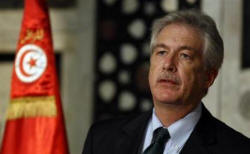|
 Deputy
Secretary Of State Burns To Retire In October Deputy
Secretary Of State Burns To Retire In October
 Send a link to a friend
Send a link to a friend
[April 12, 2014]
By Arshad Mohammed
WASHINGTON (Reuters) — U.S. Deputy
Secretary of State Bill Burns, who led secret talks with Iran that led
to an agreement to curb its nuclear program and who served as the top
U.S. diplomat for the Middle East as well as ambassador to Russia, will
retire in October, officials said on Friday.
|
|
 The departure of the Arabic-, French- and Russian-speaking
official will be felt at the State Department, where he was regarded
as the leading career diplomat of his generation and only the second
to rise to deputy secretary of state. The departure of the Arabic-, French- and Russian-speaking
official will be felt at the State Department, where he was regarded
as the leading career diplomat of his generation and only the second
to rise to deputy secretary of state.
There was no immediate word on who might replace Burns. There has
been widespread speculation within the department that the
undersecretary of state for political affairs, effectively the
third-ranking U.S. diplomat, might succeed him.
In a 32-year career, Burns held some of the most sensitive and
influential jobs in American diplomacy, including as undersecretary
for political affairs from 2008 to 2011, ambassador to Russia from
2005 to 2008 and assistant secretary of state for near eastern
affairs from 2001 to 2005.

His most significant role, however, may have been in leading the
small team that conducted secret diplomacy with Iran that helped
produce the November 24, 2013, agreement under which Tehran agreed
to limit its nuclear program in exchange for sanctions relief.
"He has been a skilled adviser, consummate diplomat and inspiration
to generations of public servants," said U.S. President Barack
Obama, adding that he had asked Burns to delay his retirement
earlier this year. "The country is stronger for Bill's service."
Secretary of State John Kerry was also lavish in his praise. "Bill is a statesman cut from the same cloth, caliber and
contribution as George Kennan and 'Chip' Bohlen, and he has more
than earned his place on a very short list of American diplomatic
legends," Kerry said.
[to top of second column] |

Kennan was the intellectual author of the U.S. policy of containing
the Soviet Union and Bohlen, another Soviet expert, helped to
develop the Marshall Plan to rebuild Europe after World War Two. All
three men served as U.S. ambassador in Moscow.
While there had been talk that Burns might leave at the end of
Obama's first term in January 2013, U.S. officials said that Kerry
asked him to stay on for an additional year.
As that deadline approached, Obama invited Burns to lunch and asked
him to stay until October 2014.
(Reporting by Arshad Mohammed; editing by G. Crosse and Will Dunham)
[© 2014 Thomson Reuters. All rights
reserved.] Copyright 2014 Reuters. All rights reserved. This material may not be published,
broadcast, rewritten or redistributed.
 |